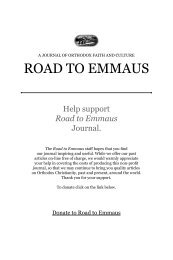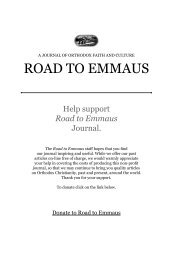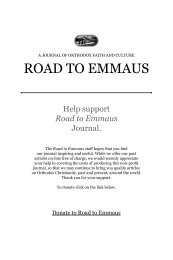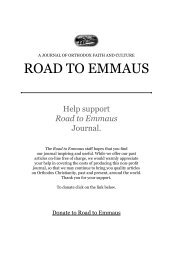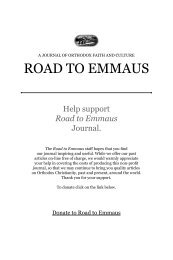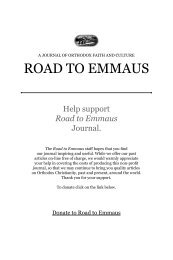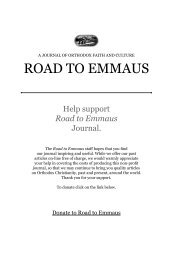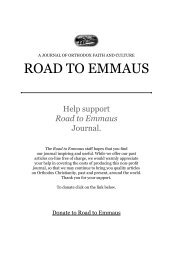<strong>Road</strong> <strong>to</strong> <strong>Emmaus</strong> Vol. XIII, <strong>No</strong>. 2 (#49)Natural Conception, Natural BirthMelanie: Yes, and also we are seeing more depression and anxiety in ourgeneral population which makes it very difficult for women and men <strong>to</strong> dealwith daily life. This is why the connection <strong>to</strong> the spiritual father is so important.The spiritual father knows the situation of each person and can guidethem accordingly. Couples may abstain for medical reasons, for severe financialreasons, or because they mentally can’t handle another child.RtE: I wonder if the financial reasons ever come by themselves? As we allknow, many poor cultures have child after child with little income at all.Melanie: My boss is fond of saying that her Irish grandmother used <strong>to</strong>say, “Ah, every baby is born with a loaf of bread under each arm!” God willprovide.I also remember that in her book, Real Choices, Frederica Mathewes-Green wrote of her travels around the United States, speaking <strong>to</strong> womenwho have had abortions. Most of these women said that the deciding fac<strong>to</strong>rin changing their mind and keeping the baby would have been, “if one personhad <strong>to</strong>ld me that they would stand by me and unfailingly support me.”I believe that we as Christians have a responsibility <strong>to</strong> help those who are inneed, whether that need is physical, mental, or economic. All of us are givengifts <strong>to</strong> help. This is why Orthodox charities like Rachel’s Vineyard, whichassists women with crisis pregnancies and healing after abortion are so important.14 This is a way <strong>to</strong> help women who want <strong>to</strong> keep their children butdon’t know how.RtE: The most radical example of personal charity I’ve heard of is fromThe Farm, a counter-culture commune in Tennessee that began in the late1960’s. Some of their women are highly trained midwives and they have aclinic as well. In the early 1970’s they put out an appeal across the U.S., “Ifyou find yourself pregnant and are thinking of an abortion, you can comeand live with us, receive prenatal care, and after giving birth, if you like, youcan stay as part of our community. If you want <strong>to</strong> leave, but don’t feel youcan care for your baby, we will take care of him, and if you want the babyback at any time you can come and get him.” I think that many women <strong>to</strong>okadvantage of this. They were also some of the first proponents of the BillingsMethod of natural conception, which was a forerunner of your own method.Melanie: Wow. People are starving for community, but at the same time weare so isolated and afraid that we don’t know where <strong>to</strong> find it. There is alsoa kind of stigma now against large families. My Catholic friends with largefamilies feel rather persecuted in public. People come up and say, “Gosh,when are you going <strong>to</strong> s<strong>to</strong>p?” An Orthodox priest in my area recently <strong>to</strong>lda group of teenagers, “When I see families with all of these kids runningaround I sometimes want <strong>to</strong> hand them birth control myself.” To hear thisbeing preached from the pulpit, that large families are somehow irresponsibleand are using up the earth’s resources is a truly Malthusian concept. 15The seven billionth person was just born, and now people are starting <strong>to</strong>bring up overpopulation again. That kind of thinking is very dangerous.RtE: What do you do if a couple comes <strong>to</strong> you with a contraceptive mentality?Melanie: There’s usually one s<strong>to</strong>ry that I tell when people ask me this. I hada young couple who had only been married about eight months who initiallywanted <strong>to</strong> learn <strong>to</strong> chart the wife’s fertile days so that they could use barriermethods only at the time of fertility. When they came in I asked, “Can youjust give me a month—one cycle—without using the artificial barrier methods,just use the system as intended, and I promise I’ll be at your beck andcall if you have any questions. They gave me that month.When the couple came in after trying this natural method as it was intended,they just seemed so in love. They were holding hands, they were close,laughing, and joyful. It was a dramatic change from their first visits and Ithought, “How beautiful and wonderful.” Later, after they had a pregnancyscare and went back <strong>to</strong> using the barrier method, I noticed a distinct changein their affect and demeanor. Another interesting fact is that among users ofnatural family planning the divorce rate is no<strong>to</strong>riously low, below 3% as opposed<strong>to</strong> the 40-50% rate that is generally reported.RtE: At the OCAMPR conference again, Professor Patitsas spoke of the ethicalproblem of artificial contraceptives and technologies being a violation ofhospitality, in this case a lack of hospitality <strong>to</strong> the child. Some people wouldtake it further and ask if abstinence isn’t a denial of hospitality <strong>to</strong> the husbandand wife, as well as <strong>to</strong> the child?14 Rachel’s Vineyard can be reached at (<strong>to</strong>ll-free) 877-467-3463 or online at: http://www.rachelsvineyard.org/15 Thomas Malthus: 18th-century English writer who was one of the first <strong>to</strong> develop the idea of overpopulationand that the world’s resources are running out.3031
<strong>Road</strong> <strong>to</strong> <strong>Emmaus</strong> Vol. XIII, <strong>No</strong>. 2 (#49)Natural Conception, Natural BirthMelanie: Although during major fasts we also abstain, as a means of openingourselves <strong>to</strong> hospitality <strong>to</strong> God. All I can say is that I think that for everythingthere is a season. We aren’t animals in heat and it’s good <strong>to</strong> temperthe passions.This is an aspect of our Orthodox faith that is very beautiful and that manyother faith traditions do not have—we not only fast from certain types offood, but from marital relations during the four major fast periods, on weekdayfast days, and before receiving Holy Communion. In traditional cultures,couples also abstain while the baby is nursing, until it is weaned, so coming<strong>to</strong>gether after these times is beautiful. This was universal in Christendombefore the Reformation. For us this is part of our spiritual life, and I hearfrom many women that coming <strong>to</strong>gether again is like another honeymoon.Very observant Orthodox Jews still refrain half of the month, from thetime of the onset of a woman’s period until a full seven days after it hass<strong>to</strong>pped. For a woman with a normal cycle, this would be the point at whichmost women naturally conceive, and because they have refrained, the manhas more potent sperm. Physiologically it all works.<strong>No</strong>w the traditional Jewish community is trying <strong>to</strong> figure out what thismeans for women who have very short cycles or abnormal bleeding. If awoman has a short 25-day cycle, she’s not necessarily going <strong>to</strong> ovulate on day14, which is when they can go dip in<strong>to</strong> the ceremonial pool, be consideredritually clean and able <strong>to</strong> be embraced by their husbands. Some rabbis havesaid that it is better for a woman <strong>to</strong> follow the fast of the Orthodox-Judaiccus<strong>to</strong>m and then <strong>to</strong> go ahead and have one of these reproductive technologiesthan <strong>to</strong> be disobedient <strong>to</strong> what the cus<strong>to</strong>m says. They would actually say,“It’s better for you <strong>to</strong> have IUF or IUI than <strong>to</strong> break this cus<strong>to</strong>m.” But theyare struggling with this now.RtE: Abstinence during the fasts is still practiced almost universally by piousOrthodox in the Slavic churches. For most of the Christian era, abstinencewas built in and births came in due season.Vulnerability, Prayer, and HopeRtE: I know that as a full-time high school teacher, you do this counseling inyour spare time as a ministry. How do you feel about your work?Melanie: When I went for training my thought was, “If I can just help oneperson have a baby, the time, travel, expense for the course in Omaha will allbe worth it.” Fortunately, there have been more than one.RtE: How does your Orthodox faith relate <strong>to</strong> your work with fertility?Melanie: I think that for every Christian, the message of the Gospel is Christcrucified and Christ resurrected, and <strong>to</strong> love your neighbor as yourself. Inlittle ways everything in our life is a crucifixion and a resurrection and yousee that mirrored with people: emotionally, physically, in every facet. Lovingyour neighbor as yourself is helping someone who is in pain. Trying <strong>to</strong> dowhat you believe is the best thing for a couple is a gift on both sides.RtE: I’ve known several women who, after finding themselves unable <strong>to</strong> conceive,finally opened their hearts <strong>to</strong> adopting a child. After putting in the application,they suddenly discovered themselves pregnant. Do you think thatthe vulnerability of just abandoning oneself <strong>to</strong> God’s providence is an aid <strong>to</strong>conception?Melanie: Yes, this is the idea that we don’t set our own stubborn will upin opposition <strong>to</strong> God’s will. At the root of that is pride and egoism. We wantwhat we want, when we want it. When God doesn’t give it <strong>to</strong> us we can kindof pout. We hear s<strong>to</strong>ries all the time that when people finally give up and letgo of the desire is when they are blessed.RtE: Similarly in the 12-step programs, once people finally admit their inability<strong>to</strong> control their own lives, they often have an experience of God andthings start moving for them.Melanie: Tenderness and weakness can also initiate a change because thereis a great amount of guilt, blame and shame that go hand-in-hand with infertility.It can be a very painful process for an individual and a couple. We canfeel very hurt and lost because we think that something that should fulfill us isbeyond our reach. Women particularly feel that biological clock ticking. Thiscan lead us <strong>to</strong> some of the decisions that infertile women make—<strong>to</strong> use IVFor another reproductive technology. The pain and longing can be very acute.It is particularly hard for those of us in a western society who are taught,“If you work hard enough you will get it.” This is the American dream that3233
- Page 1 and 2:
A JOURNAL OF ORTHODOX FAITH AND CUL
- Page 3 and 4:
CHRIST,THE MEDICINEOF LIFE:The Syri
- Page 5 and 6:
Road to Emmaus Vol. VI, No. 1 (#20)
- Page 7 and 8:
Road to Emmaus Vol. VI, No. 1 (#20)
- Page 9 and 10:
CHRIST, THE MEDICINE OF LIFEterrors
- Page 11 and 12:
Road to Emmaus Vol. VI, No. 1 (#20)
- Page 13 and 14:
Road to Emmaus Vol. VI, No. 1 (#20)
- Page 15 and 16:
CHRIST, THE MEDICINE OF LIFEfallen
- Page 17 and 18:
Road to Emmaus Vol. VI, No. 1 (#20)
- Page 20 and 21:
Road to Emmaus Vol. VI, No. 1 (#20)
- Page 22 and 23:
Road to Emmaus Vol. VI, No. 1 (#20)
- Page 24 and 25:
CroaghPatrick:The GloriousClimb ofI
- Page 26 and 27:
Road to Emmaus Vol. XII, No. 2 (#45
- Page 28 and 29:
Road to Emmaus Vol. XII, No. 2 (#45
- Page 30 and 31:
Road to Emmaus Vol. XII, No. 2 (#45
- Page 32 and 33:
Road to Emmaus Vol. XII, No. 2 (#45
- Page 34 and 35:
Road to Emmaus Vol. XII, No. 2 (#45
- Page 36 and 37:
Road to Emmaus Vol. XII, No. 2 (#45
- Page 38 and 39:
Road to Emmaus Vol. XII, No. 2 (#45
- Page 40 and 41:
Road to Emmaus Vol. XII, No. 2 (#45
- Page 42 and 43:
Road to Emmaus Vol. XII, No. 2 (#45
- Page 44 and 45:
THEASTONISHINGMISSIONARYJOURNEYS OF
- Page 46 and 47:
the astonishing missionary journeys
- Page 48 and 49:
Road to Emmaus Vol. V, No. 4 (#19)a
- Page 51:
Road to Emmaus Vol. V, No. 4 (#19)t
- Page 55 and 56: Road to Emmaus Vol. V, No. 4 (#19)t
- Page 57 and 58: the astonishing missionary journeys
- Page 59 and 60: the astonishing missionary journeys
- Page 61 and 62: the astonishing missionary journeys
- Page 64 and 65: Road to Emmaus Vol. V, No. 4 (#19)t
- Page 66 and 67: Road to Emmaus Vol. V, No. 4 (#19)t
- Page 68 and 69: Road to Emmaus Vol. V, No. 4 (#19)t
- Page 70 and 71: Road to Emmaus Vol. V, No. 4 (#19)t
- Page 72 and 73: Road to Emmaus Vol. XI, No. 4 (#43)
- Page 74 and 75: Road to Emmaus Vol. XI, No. 4 (#43)
- Page 76 and 77: Road to Emmaus Vol. XI, No. 4 (#43)
- Page 78 and 79: Road to Emmaus Vol. XI, No. 4 (#43)
- Page 80 and 81: Road to Emmaus Vol. XI, No. 4 (#43)
- Page 82 and 83: Road to Emmaus Vol. XI, No. 4 (#43)
- Page 84 and 85: Road to Emmaus Vol. XI, No. 4 (#43)
- Page 86 and 87: Road to Emmaus Vol. XI, No. 4 (#43)
- Page 88 and 89: Road to Emmaus Vol. XI, No. 4 (#43)
- Page 90 and 91: Road to Emmaus Vol. XI, No. 4 (#43)
- Page 92 and 93: NaturalConception,Natural Birth:The
- Page 94 and 95: Road to Emmaus Vol. XIII, No. 2 (#4
- Page 96 and 97: Road to Emmaus Vol. XIII, No. 2 (#4
- Page 98 and 99: Road to Emmaus Vol. XIII, No. 2 (#4
- Page 100 and 101: Road to Emmaus Vol. XIII, No. 2 (#4
- Page 102 and 103: Road to Emmaus Vol. XIII, No. 2 (#4
- Page 104 and 105: Road to Emmaus Vol. XIII, No. 2 (#4
- Page 108 and 109: Road to Emmaus Vol. XIII, No. 2 (#4
- Page 110 and 111: Road to Emmaus Vol. XII, No. 1 (#44
- Page 112 and 113: Road to Emmaus Vol. XII, No. 1 (#44
- Page 114 and 115: Road to Emmaus Vol. XII, No. 1 (#44
- Page 116 and 117: Road to Emmaus Vol. XII, No. 1 (#44
- Page 118 and 119: Road to Emmaus Vol. XII, No. 1 (#44
- Page 120 and 121: Road to Emmaus Vol. XII, No. 1 (#44
- Page 122 and 123: Road to Emmaus Vol. XII, No. 1 (#44
- Page 124 and 125: Orthodoxy in IndonesiaAn Interview
- Page 126 and 127: Road to Emmaus Vol. 2, No. 3 (#6)Or
- Page 128 and 129: Road to Emmaus Vol. 2, No. 3 (#6)Or
- Page 130 and 131: Road to Emmaus Vol. 2, No. 3 (#6)Or
- Page 132 and 133: 18 Road to Emmaus, Vol. 2, No. 3 (#
- Page 134 and 135: Road to Emmaus Vol. VII, No. 1 (#24
- Page 136 and 137: Road to Emmaus Vol. VII, No. 1 (#24
- Page 138 and 139: Road to Emmaus Vol. VII, No. 1 (#24
- Page 140 and 141: Road to Emmaus Vol. VII, No. 1 (#24
- Page 142 and 143: Road to Emmaus Vol. VII, No. 1 (#24
- Page 144 and 145: Road to Emmaus Vol. VII, No. 1 (#24
- Page 146 and 147: Road to Emmaus Vol. VII, No. 1 (#24
- Page 148 and 149: Road to Emmaus Vol. III, No. 3 (#10
- Page 150 and 151: Road to Emmaus Vol. III, No. 3 (#10
- Page 152 and 153: FROM JAINISM TOORTHODOXY:AN INDIANP
- Page 154 and 155: Road to Emmaus Vol. VI, No. 2 (#21)
- Page 156 and 157:
FROM JAINISM TO ORTHODOXYDigambara
- Page 158 and 159:
Road to Emmaus Vol. VI, No. 2 (#21)
- Page 160 and 161:
FROM JAINISM TO ORTHODOXYELESA: Tha
- Page 162 and 163:
Road to Emmaus Vol. VI, No. 2 (#21)
- Page 164 and 165:
FROM JAINISM TO ORTHODOXYGrowing up
- Page 166 and 167:
Road to Emmaus Vol. VI, No. 2 (#21)
- Page 168 and 169:
FROM JAINISM TO ORTHODOXYELESA: Yes
- Page 170 and 171:
Road to Emmaus Vol. VI, No. 2 (#21)
- Page 172 and 173:
FROM JAINISM TO ORTHODOXYELESA: Not
- Page 174 and 175:
THE GOLDENTHREAD OFFAITH:MENTAL ILL
- Page 176 and 177:
Road to Emmaus Vol. V, No. 2 (#17)t
- Page 178 and 179:
the golden thread of faithare usual
- Page 180 and 181:
Road to Emmaus Vol. V, No. 2 (#17)b
- Page 182 and 183:
the golden thread of faitha great s
- Page 184 and 185:
Road to Emmaus Vol. V, No. 2 (#17)t
- Page 186 and 187:
Road to Emmaus Vol. X, No. 1 (#36)a
- Page 188 and 189:
Road to Emmaus Vol. X, No. 1 (#36)a
- Page 190 and 191:
Road to Emmaus Vol. X, No. 1 (#36)r
- Page 192 and 193:
Road to Emmaus Vol. X, No. 1 (#36)T
- Page 194 and 195:
Road to Emmaus Vol. X, No. 1 (#36)r
- Page 196 and 197:
Road to Emmaus Vol. X, No. 1 (#36)T
- Page 198 and 199:
Road to Emmaus Vol. VIII, No. 2 (#2
- Page 200 and 201:
Road to Emmaus Vol. VIII, No. 2 (#2
- Page 202 and 203:
Road to Emmaus Vol. VIII, No. 2 (#2
- Page 204 and 205:
…Krom, he who has been born in yo
- Page 206 and 207:
Abandoned Church of St. Theodore, S
- Page 208 and 209:
FAITH UNSEENMany of these crypto-Ch
- Page 210 and 211:
Old aerial view of Kromni, early 20
- Page 212 and 213:
FAITH UNSEENCrypto-Christian Baptis
- Page 214 and 215:
St. Gregory of Nyssa Church, 1930,
- Page 216 and 217:
FAITH UNSEENO Bride, keep your husb
- Page 218 and 219:
Panagia Soumela Monastery, where ma
- Page 220 and 221:
FAITH UNSEENsaid, “What I am tell
- Page 222 and 223:
Greek hunting party with visiting R
- Page 224 and 225:
FAITH UNSEENAnas of 795 AD still he
- Page 226 and 227:
Trebizond (Trabzon) city walls.
- Page 228 and 229:
FAITH UNSEENOttoman administrator,



